Are older adults more prone to anxiety, depression, and stress-related mental disorders stemming from isolation related to social distancing during the COVID-19 pandemic?
It has been a persistent concern since the earliest days of the pandemic, which has disproportionately affected older individuals and those with chronic conditions—heart disease, hypertension, chronic obstructive pulmonary disease, and other diseases that render people susceptible to the virus.
But a viewpoint in JAMA drawing on research from the first months of the pandemic suggest something more positive.
“[S]tudies from different countries have shown that at least some older adults are not experiencing disproportionately increased negative mental health consequences commensurate with the elevated risks they faced during the first few months of the COVID-19 pandemic,” wrote Ipsit Vahia, M.D., medical director of Geriatric Psychiatry Outpatient Services at McLean Hospital; past APA President Dilip Jeste, M.D., director of the Sam and Rose Stein Institute for Research on Aging at UC San Diego; and Charles Reynolds III, M.D., a professor of psychiatry at the University of Pittsburgh Medical Center.
Moreover, it appears that older people are experiencing less depression, anxiety, and stress-related conditions than younger people.
Vahia and colleagues cited a survey of 5,412 community-dwelling adults conducted by the Centers for Disease Control and Prevention from June 24 to 30, 2020. The survey found that compared with younger age groups, the percentage of participants aged 65 years or older with anxiety disorder (6.2%), depressive disorder (5.8%), or trauma- or a stress-related disorder (9.2%) was lower. According to the report, of the 731 participants aged 18 through 24 years, 49.1% reported anxiety disorder; 52.3%, depressive disorder; and 46%, trauma- or a stress-related disorder. The findings mirror those of other high-income countries, including Spain, Canada, and the Netherlands, they noted.
Vahia and colleagues cautioned that the results are from surveys conducted early in the pandemic, and the longer-term effects of COVID-19, “especially in countries like the U.S. with very high rates of disease, remain unclear.” Moreover, there are no similar data on subgroups of older adults such as those with dementia, those caring for people with dementia, or those residing in assisted-living facilities or nursing homes. The effect of comorbid chronic medical or psychiatric conditions also remains unclear.
But they noted that older adults may have traits of resilience that have enabled them to withstand the stresses of COVID-19, especially wisdom and a tendency to value the quality of a few close relationships over having many more superficial relationships. The authors noted that several recent studies involving various groups of people across the adult lifespan have shown a significant inverse correlation between loneliness and wisdom; other data also suggest that compassion may reduce loneliness and promote greater well-being.
In comments to Psychiatric News, Jeste said, “There is a nearly universal tendency to think of older adults as physically, cognitively, and mentally disabled people. This is wrong on multiple levels. With aging, people become more different individually, so we shouldn’t stereotype all the older adults into one lump of disabled seniors.”
Moreover, Jeste said that research has shown that mental well-being tends to improve with aging even when physical health is worsening. “Because of their past experience, many older people become wiser and more resilient,” he said. “We should not patronize them but instead respect them and learn how they can still manage the adversities with such grit, emotional regulation, self-reflection, and compassion. They can be role models for younger patients as well as their caregivers.”
Carol Podgorski, Ph.D., M.P.H., an associate professor of psychiatry at the University of Rochester, who reviewed the report for Psychiatric News, said the JAMA article “represents a welcome departure from the usual scenario that too often casts older adults in a cloud of despair.”
She said, “This commentary is useful in that it calls scientists and clinicians to question what we can learn from and about older adults during this challenging time.”
Podgorski, who is co-director of the Family Therapy Training Program at the Institute for the Family at the University of Rochester, said that in her own clinical work with families and older adults, several themes related to coping during the pandemic have emerged.
“Some older adults reported that they feel less stress because there is no expectation for them to have to perform to the level previously expected,” she told Psychiatric News. “This group conveyed that it takes a lot for them to organize and prepare for a day of activities and that it requires stamina. Other adults, including caregivers, reported feeling better because they no longer felt that they were missing out on things going on around them because everything was shut down, and everyone was in the same situation. For them, the pandemic has helped them because now others have more empathy for people who care for older people and for their lived experience of being isolated and restricted from life.
“I have also heard from older adults who expressed gratitude for having been able to live lives filled with rich experiences,” she continued. “They also expressed compassion and sadness for emerging adults who are not able to experience the joys and freedoms that normally characterize that phase of life.” ■

